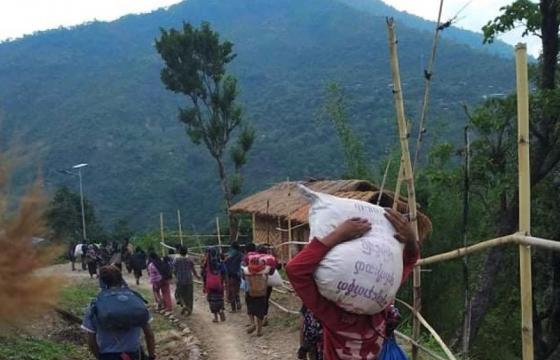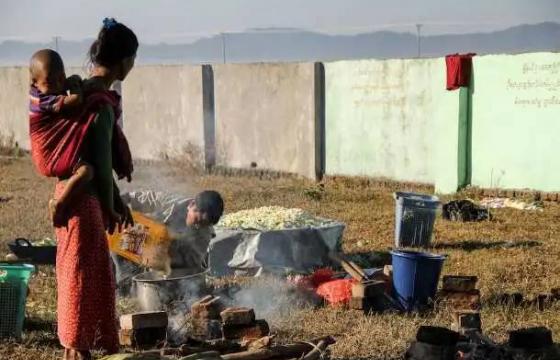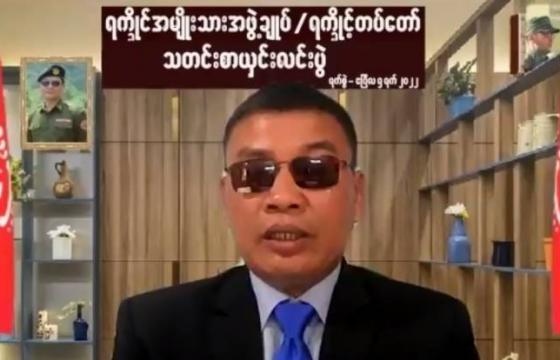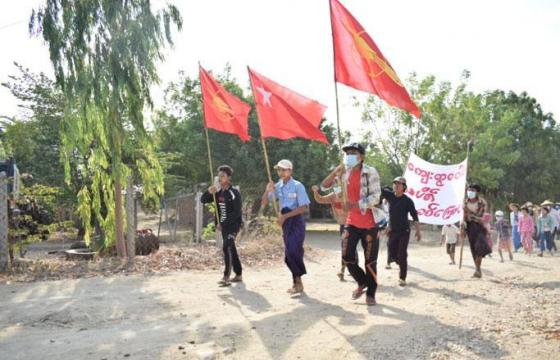Sai Wansai —Just as the Kachin Independence Organization (KIO) has been stuck in a dilemma on its choice to be either with the United Nationalities Federal Council (UNFC) or Federal Political Negotiation and Consultative Committee (FPNCC), also popularly known as Panghsang alliance, for a few weeks ago, but now already decided to be with the latter, many have been speculating that the Shan State Progress Party/Shan State Army (SSPP/SSA) might now be also in the same position as the KIO to either opt for one or the other of the said two ethnic umbrella armed organizations.
While the KIO did officially tendered its resignation and also got approval for its exit from the UNFC, during its second congress meeting from June 20 to 29, the SSPP has chosen to stay on, which creates a situation that it is involved in both the UNFC and FPNCC.
Let us look into it, if the SSPP is really in a dilemma of choice to which it wants to belong to or whether it has an unspoken consent, to act as member in both the ethnic umbrella organizations.
Background of SSPP/SSA
In order to be clear it is important to understand the formation or have the bird’s eye view of Shan armed organizations. But first the name Shan State Army (SSA) that is being used by both the northern and southern Shan armies need to be explained.
SSPP/SSA is the northern Shan army and the Restoration Council of Shan State/Shan State Army (RCSS/SSA) is the southern Shan army.
SSPP/SSA has its headquarters in Wan Hai, Kehsi Township, northern Shan State, with its operational areas covering Namkham, Langkho, Hsipaw, Kyaukme, Monghsu, Tangyan, Mongyai, Kehsi, Lashio Township. It has an estimated strength of some 8,000 soldiers.
It was born out of the original Shan resistance on May 21 1958. On April 25, 1960 the Shan State Independence Army (SSIA) was formed in Loi Lang, Mong Yawn, Kengtung state with Hkun Maha as chairman and Sao Hso Hkarn as secretary general. On April 24, 1964 Shan resistance forces formed the Shan State Army (SSA) with Sao Nang Hearn Kham (Mahadevi of Yawnghwe) as chairman. In 1971, the Shan State Progress Party (SSPP) was established and its first congress was held on August 16, 1971. The SSPP signed a ceasefire agreement with Myanmar government in 1989.
Due to the Burma Army’s pressure to transform into Border Guard Force (BGF) in 2010, the SSPP/SSA brigade 3 and 7 were transformed into BGF in the following year but the strongest brigade 1 led by Lt. General Pang Fa rejuvenated the SSPP/SSA and refused to become BGF.
Even though it continued to honor the ceasefire agreement of 1989, the Burma Army harassed and attacked the SSPP/SSA on and off, in order to force it to either surrender or become a BGF like the others.
SSPP/SSA is also a member of the Committee for Shan State Unity (CSSU) which is comprised of the following organizations.
- Shan State Joint Action Committee (a coalition of Shan Nationalities League for Democracy, Shan State Progress Party/Shan State Army, and Shan State Militia Force)
- Shan Nationalities Democratic Party (SNDP)
- Restoration Council of Shan State/ Shan State Army (RCSS/SSA)
- Shan Community Based Organizations
- Tai Youth Organization
- Shan Lawyers Network
- New Generation Shan State
- Tai National Association Thailand
- Eastern Shan State Development and Democratic Party (ESSDDP)
- Tai Youth Network (TYN)
SSPP previously was involved in National Democratic Front (NDF) and Ethnic Nationalities’ Council (ENC), the two predecessor ethnic umbrella organizations of the UNFC.
SSPP’s unique position
SSPP’s controversial political position, in relation to its membership in UNFC and FPNCC, has been criticized among the keen Burma watchers, observers and also the stakeholders, which ranges from opinion like being a fence-sitter, opportunist to a smart tactician with political acumen.
According to one SSPP top functionary, who doesn’t want to be named, Sao Sai Htoo, top peace negotiator of the organization, is that there is no clause by either side – UNFC and FPNCC – which says that the SSPP should leave one to join the other. But there is a bit unclear political stance on whether if the SSPP joining of the northern group or FPNCC is a military expediency or a political alliance, as the United Wa State Army (UWSA) that leads the group has often insisted to be the latter.
The SSPP on the other hand seems to be saying that joining the UNFC is political, while involving in the FPNCC is for military purpose, to fend off the Burma Army offensives together as a necessity.
Geographically, the SSPP is located right in the middle, with the UWSA in the east, RCSS in the south and to the north, the Northern-Alliance – Burma (NA-B) made up of Ta’ang National Liberation Army (TNLA), Kachin Independence Army (KIA), Arakan Army (AA) and Myanmar National Democratic Alliance Army (MNDAA) or Kokang.
In addition, to its north, RCSS also has pockets of operational areas, which has led to occasional armed clashes between the TNLA and itself. The SSPP has last year offered its good office to be a mediator to end the armed conflict between the two, but so far nothing has been undertaken.
Analysis
SSPP doesn’t seem to have the dilemma of KIO in having to choose one alliance group from the two. But has positioned itself to be a bridge between the two alliances, apart from projecting to become an ethnic nationalities political platform embracing the whole spectrum through UNFC’s basic founding principles.
In addition to its basic commitment, the UNFC’s eight-point amendment proposal for the NCA was, at an earlier stage, endorsed by the NA-B. And only after the formation of the Panghsang alliance or FPNCC had the NA-B members started to reject the NCA line of approach, arguing for a new game plan that is entirely different.
FPNCC advocacy was to stop the war nationwide first and enter the peace negotiation process within the agreed time-span, after which would the agreement become ineffective if negotiation failed to start within the appointed time-frame.
But following the 21st Century Panglong Conference (21CPC), held from May 24 until 29, where the Panghsang alliance members were invited as special guests, due to the Chinese pressure on the Burmese government, but were not given fully fledged participation status, changed their demand from total rejection of the Nationwide Ceasefire Agreement (NCA) to the amendment of it so that they could also sign it and enter political dialogue as full negotiation members in the 21CPC.
However it is not clear if the FPNCC is ready to accept UNFC bargaining position that is based on its eight-point proposal that previously had been approved by the NA-B.
The UNFC eight point proposal that should be added to the NCA are:
- Bilateral ceasefire agreement between the government-military and the UNFC;
- To build a federal union with result achieved from 21CPC;
- Agreement of tripartite dialogue composition;
- Drafting and promulgation of constitutional law based on the outcome of 21CPC;
- Advance agreement on Military Codes of Conduct (CoC) and monitoring on Terms of Reference (ToR);
- Formation of military Joint Monitoring Committee (JMC) with representatives from government, EAOs and international figures acceptable to both parties;
- Formation of a neutral, enforcement tribunal for NCA involving domestic and international law experts and judges that are acceptable to both parties; and
- Developmental projects to be tackled according to Extractive Industries Transparency Initiative (EITI), in cooperation with the public and the EAOs. (Source: UNFC Documentation)
Meanwhile, there has been no movement on whether the UNFC’s Delegation for Political Negotiation (DPN) and government’s Peace Commission (PC) would talk over and make decisions accordingly on the eight-point proposal. At the same time, government’s PC overtures through the Chinese has not progress to the actual meeting, as the PC’s insistence to meet the FPNCC members separately were duly rejected.
According to recent interview on July 8 with the media, the TNLA vice chairman Tar Jode Jar said: “During last month 14 (June) and 15 (June), they (the government’s PC) told the Chinese that they wanted to meet us. We heard that U Thein Zaw initiated he proposal through the Chinese.”
He added that since the last month rejection of all the members of the FPNCC to meet the government PC’s proposed separate meeting in two groups, one with the NA-B and the other with the rest of three members, nothing has happened.
In sum, it could be said that the SSPP sees itself as a mediator and a bridge between the two non-signatory EAOs ethnic umbrella groups of UNFC and FPNCC, while through empowering the UNFC by its continued membership to promote the ethnic solidarity also with those who have already signed the NCA and are involved in the ongoing peace negotiation process with the government. Reportedly, it was said that the UNFC would hold an all ethnic conference, similar to the Mai Ja Yang and Law Khee Lah, where ethnic leadership meetings were held, to work out common policies in the ongoing struggle for the establishment of a genuine federal union.
Thus, it seems the SSPP’s participation in both UNFC and FPNCC has the approval or consent of both the alliance groups, if not an agreed arrangement.






